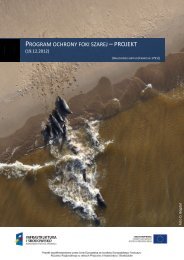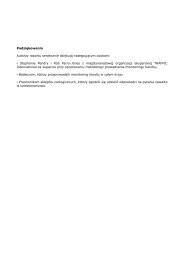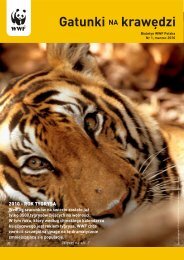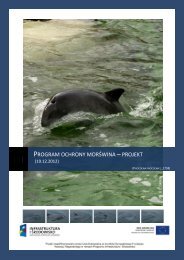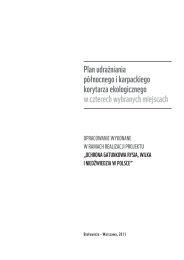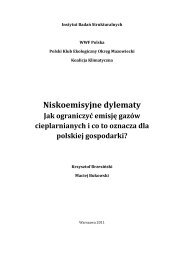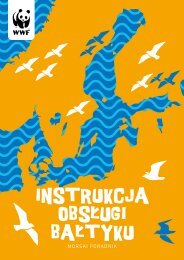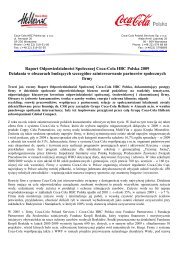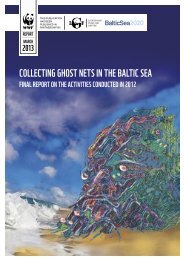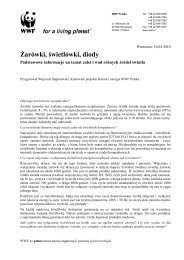Biodiversity, biocapacity and better choices
Biodiversity, biocapacity and better choices
Biodiversity, biocapacity and better choices
You also want an ePaper? Increase the reach of your titles
YUMPU automatically turns print PDFs into web optimized ePapers that Google loves.
One Planet perspectiveMost people essentially desire the same thing: A life where needsare met; to be safe <strong>and</strong> healthy; to be able to explore interests<strong>and</strong> realize potential; <strong>and</strong> to improve well-being. Along with thesepersonal aspirations, they have the support of all 193 memberstates of the United Nations, which have committed under variousinternational agreements to end poverty, ensure safe drinkingwater, protect biodiversity <strong>and</strong> reduce greenhouse gas emissions.The trends <strong>and</strong> analyses outlined in this report suggestthat under “business as usual”, such expectations <strong>and</strong> commitmentswill become increasingly difficult to meet.In order to reverse the declining Living Planet Index, bringthe Ecological Footprint down to within planetary limits, avoiddangerous climate change <strong>and</strong> achieve sustainable development,a fundamental reality must be embedded as the basis of economies,business models <strong>and</strong> lifestyles: The Earth’s natural capital –biodiversity, ecosystems <strong>and</strong> ecosystem services – is limited.WWF’s One Planet perspective explicitly proposes tomanage, govern <strong>and</strong> share natural capital within the Earth’secological boundaries. In addition to safeguarding <strong>and</strong> restoringthis natural capital, WWF seeks <strong>better</strong> <strong>choices</strong> along the entiresystem of production <strong>and</strong> consumption, supported by redirectedfinancial flows <strong>and</strong> more equitable resource governance. All ofthis, <strong>and</strong> more, is required to decouple human development fromunsustainable consumption (moving away from material <strong>and</strong>energy-intensive commodities), to avoid greenhouse gas emissions,to maintain ecosystem integrity, <strong>and</strong> to promote pro-poor growth<strong>and</strong> development (Figure 58).The One Planet perspective reminds us that our <strong>choices</strong>are highly interdependent. Preserving natural capital, for example,will affect decisions <strong>and</strong> possible outcomes relating to the way weproduce <strong>and</strong> consume. Financial flows <strong>and</strong> governance structureswill similarly determine to a great extent whether production<strong>and</strong> consumption <strong>choices</strong> will actually contribute to biodiversityconservation, ecosystem integrity <strong>and</strong>, ultimately, food, water<strong>and</strong> energy for all.This chapter outlines the top 16 priority actions requiredfor living within the means of one planet. Implementing sucha paradigm shift will be a tremendous challenge. We all faceuncomfortable <strong>choices</strong> <strong>and</strong> trade-offs, but only by taking brave,informed decisions can healthy, sustainable <strong>and</strong> equitable humansocieties be ensured, now <strong>and</strong> into the future.WWF’s One Planetperspectiveproposes tomanage, govern<strong>and</strong> share naturalcapital within theEarth’s ecologicalboundariesFigure 58: OnePlanet perspectiveThe centre panelsreflect <strong>better</strong> <strong>choices</strong>for managing, using<strong>and</strong> sharing naturalresources within OnePlanet limitations <strong>and</strong>ensuring food, water<strong>and</strong> energy security.Redirected financial flows<strong>and</strong> equitable resourcegovernance are essentialenabling factors.€$¥RedirectFinancialFlowsValue natureAccount forenvironmental<strong>and</strong> social costsSupport <strong>and</strong> rewardconservation,sustainable resourcemanagement<strong>and</strong> innovationECOSYSTEMINTEGRITYBETTER CHOICESFROM A ONE PLANETPERSPECTIVEPreserve Natural Capital• Restore damaged ecosystems <strong>and</strong>ecosystem services• Halt loss of priority habitats• Significantly exp<strong>and</strong> the globalprotected areas networkProduce Better• Significantly reduce inputs <strong>and</strong> wastein production systems• Manage resources sustainably• Scale-up renewable energy productionConsume More Wisely• Achieve low-footprint lifestyles• Change energy consumption patterns• Promote healthy consumption patternsBIODIVERSITYCONSERVATIONEquitableResourceGovernanceShare availableresourcesMake fair <strong>and</strong>ecologicallyinformed <strong>choices</strong>Measure successbeyond GDPFOOD, WATER ANDENERGY SECURITYWWF Living Planet Report 2012 page 106 Chapter 4: Better <strong>choices</strong> for a living planet page 107



